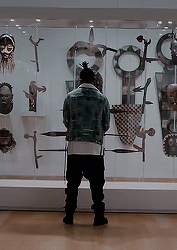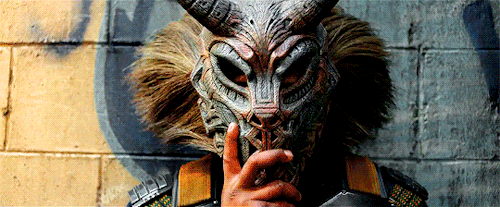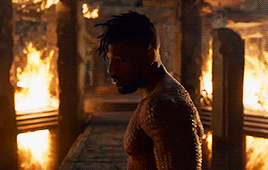It’s been legit years since I’ve written on this blog but after watching Black Panther twice this weekend, I had to revisit it.
SPOILERS AHEAD
There are many reasons why Black Panther is such a great movie.
Coogler manages to strike the exact right balance between action and emotion;
the plot is rooted in a substantive story; and the characters are fleshed-out
human beings with layers and complexities as opposed to caricatures or
archetypes. The prominence of intelligent, strong-willed, personable black
female characters and their integral contributions to plot, story and the very
fabric of the film is nothing short of spectacular.
Like I said, it’s
a great movie for different reasons and I could write an essay on each reason
but this post is specifically about Erik Killmonger and the beauty of a complex
antagonist.
One of the many
great things about Black Panther is
that while it manages to be accessible to all audiences, it also speaks
directly to black audiences whether in the diaspora or on the continent. The
movie deftly explores continental African culture as well as African American
culture both respectively and in relation to each other. The movie also
addresses the various ways that white supremacy has enacted its oppression on
black people whether it’s through showing the display of stolen West African
artefacts in a UK museum
 |
| source: https://amberjliu.tumblr.com/post/171023030692/erik-killmonger-black-panther-2018 |
or the discussion of over-policing and inflated
incarceration rates in the U.S. Anti-blackness is global and multifaceted and BP manages to show that with subtlety
and precision.
Erik is an
empathetic and layered character because while he is African American, he is
also representative of the diaspora as a whole. While BP uses Wakanda to celebrate the various cultures in Africa, it
uses Erik to explore the longing of the diaspora to reconnect to those same
cultures whether it’s through him taking a mask from the West African exhibit
 |
| source: http://demonio-dos-pampas.tumblr.com/post/161648103138 |
or through the revelation that at the beginning of the movie, it isn’t T’Challa
asking T’Chaka about the origin of Wakanda, it’s Erik asking N’Jobu. More than
that, Erik was raised in a society shaped by white supremacy and due to his
career path, visited various countries around the world subjugated to that same white supremacy. So when he shows up at Wakanda demanding that they help their "brothers and sisters in need", explaining that black people have been subjugated and oppressed and started
revolutions with next to nothing; when he shames Wakanda for their detachment,
he is not wrong. At all. However, what
makes Killmonger an antagonist as opposed to a hero or even an anti-hero, in my
opinion, isn’t his “by any means necessary” approach but the fact that his
intention and his rhetoric actually don’t align.
Throughout Killmonger’s time onscreen I
found myself nodding my head, muttering “he’s not wrong through” nearly every
time he spoke. Yet I think it is made clear that he doesn’t actually intend for
the oppressed to overthrow the oppressor, his intention is destruction. And no,
I don’t mean “burn down the system and start from the ground up” destruction
but complete and utter annihilation.
 | |
| source: http://fallenvictory.tumblr.com/post/167853472722/ive-waited-my-entire-life-for-this |
He admits as much during his final fight
with T’Challa when he proclaims that the world has taken everything from him, everything
he ever loved and this way they’ll be even. He speaks of arming Wakandan war
dogs and the oppressed peoples of various countries but without formulating or
discussing a strategy of any kind for the revolution itself or for what would
happen after. He can only pronounce that Wakanda will rule over everything.
For me, it’s less
about the fact that he was demanding Wakanda become the very thing he hates and
more about the fact that the violence and toxicity and trauma of white
supremacy broke him to the point that he couldn’t see anything outside of his
own pain and rage. This is why the movie ends up agreeing with Erik’s rhetoric
but not his intention. T’Challa not only faces his father and ancestors to tell
them that they were wrong, he comes up with strategies and plans for Wakanda to
actually reach those in need.
The tension
between rhetoric and intention and the context
of Erik’s intention is what makes him such a great antagonist. It is what
allowed for my viewing experience in which I wholeheartedly rooted for T’Challa
and yet empathized deeply with Killmonger. T’Challa was the hero I wanted to
see succeed but the entirety of my emotional responses to the film came from
Erik’s scenes. In other words, if you haven’t seen Black Panther yet, I recommend you check it out, right the hell
now!